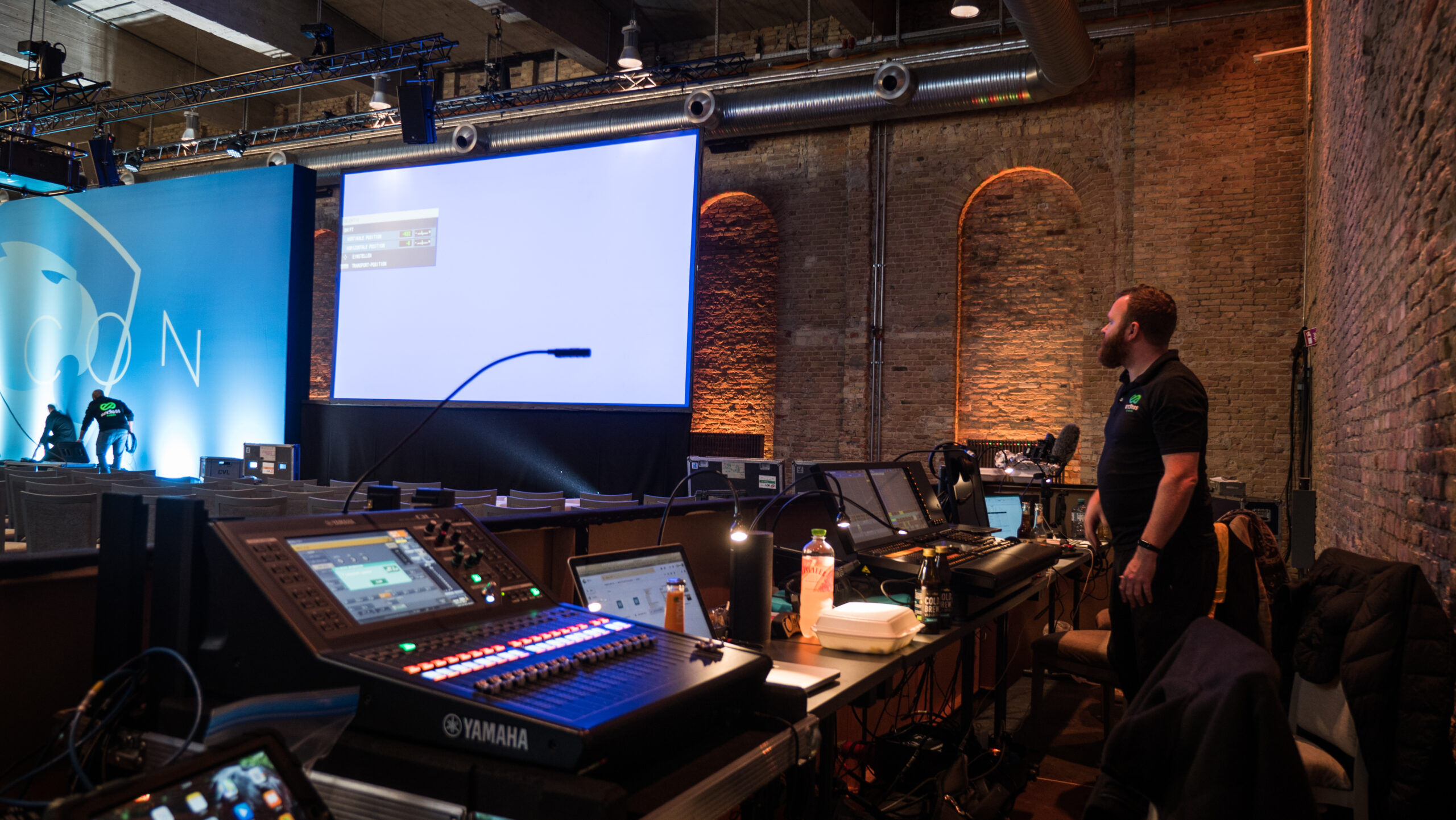Exactly How Event Production Works: A Comprehensive Consider the Process
Event production is a complicated and structured procedure that calls for careful preparation and execution. It begins with developing clear purposes and comprehending the target audience. Each step, from budgeting to place selection, plays a vital role in making certain success. As the procedure unravels, different aspects must straighten effortlessly. Yet, the subtleties of this elaborate operation commonly go undetected. What are the crucial stages that add to an unforgettable event?

The First Preparation Phase
When beginning on event production, cautious planning is vital to guarantee a successful result. The preliminary drawing board functions as the structure for all subsequent efforts. Throughout this stage, event manufacturers have to specify the event's purpose and objectives plainly. Determining the target audience helps tailor the experience and messaging, assuring importance and engagement.Producers need to also take into consideration the event style, whether it be in-person, virtual, or hybrid, as this will certainly influence various logistical components. Choosing a suitable day and location is vital, as it impacts accessibility and availability.Furthermore, constructing a reliable group is basic for splitting duties and streamlining interaction. Establishing a timeline with landmarks assurances all jobs are finished on schedule. This stage includes complete research study, consisting of recognizing prospective obstacles and devising strategies to alleviate threats. Eventually, a well-structured first planning phase establishes the tone for an effective event production journey.

Budgeting and Resource Appropriation
In event production, effective budgeting and source appropriation are essential for success - event production charlotte. Establishing economic specifications sets the structure for all succeeding choices, while source circulation methods ensure that every element of the event is appropriately supported. With each other, these components assist keep control over expenditures and enhance making use of readily available sources
Developing Financial Parameters
Developing monetary criteria is vital to the success of any kind of event production, as it sets the structure for effective budgeting and resource appropriation. This process starts with specifying the total budget plan, which incorporates all aspects of the event, including place prices, event catering, and advertising. By identifying available funds, event organizers can focus on expenses and designate sources appropriately. Additionally, it is necessary to conduct comprehensive market study to expect possible prices and recognize financing resources, such as sponsorships or ticket sales. Developing clear monetary parameters likewise aids in danger management, allowing planners to reserve contingency funds for unexpected costs. Inevitably, a distinct spending plan functions as a roadmap, assisting the event production group in the direction of accomplishing their objectives while preserving monetary control.
Source Circulation Approaches
Reliable resource circulation methods are necessary for maximizing the impact of an occasion while adhering to budget plan restraints. Successful event production calls for a thorough strategy to budgeting and resource appropriation. Planners must prioritize important aspects such as location, catering, and technology, ensuring that funds are alloted to locations that boost participant experience. A comprehensive budget must describe anticipated expenditures and recognize locations for potential price savings, such as bargaining with vendors or checking out sponsorship opportunities. Furthermore, tracking expenses throughout the planning procedure assists stop overspending. By utilizing critical resource circulation, event producers can supply an unforgettable experience while preserving monetary duty, inevitably adding to the overall success of the event.
Venue Selection and Logistics
Choosing the ideal location is important to the success of any type of event, as it establishes the stage for the general experience. Venue selection involves examining different variables, consisting of ability, access, and area. Coordinators have to think about the target market and the nature of the event, guaranteeing the venue straightens with the event's goals.Logistics play a significant duty in this process, including setups for seating, audiovisual devices, and catering solutions. An appropriate location ought to help with smooth flow for guests and personnel, boosting engagement.Additionally, evaluating prospective places for amenities like car park, toilets, and emergency situation exits is essential for security and convenience. The timeline for securing the place is likewise crucial, as preferred locations might book promptly - event production charlotte. Consequently, comprehensive planning and prompt execution can inevitably add to a smooth event experience, making venue selection and logistics fundamental components of effective event production
Imaginative Idea Growth
While the venue establishes the physical stage, innovative principle development shapes the event's identification and narrative. This process begins with identifying the event's purpose and target audience, permitting event manufacturers to create a compelling theme that reverberates with guests. Conceptualizing sessions usually include varied perspectives, fostering innovative ideas that straighten with the event's goals.Once a theme is established, aesthetic aspects such as color combinations, signage, and design are created to boost the total ambience. Narration strategies might also be integrated to develop an engaging trip for individuals, assuring an unforgettable experience. In addition, considerations relating to amusement, tasks, and interactive elements are straightened with the picked idea, reinforcing the motif throughout the event.Ultimately, efficient innovative concept advancement guarantees that every element of the event works cohesively, leaving an enduring impact on participants and satisfying the event's objectives. This fundamental work lays the foundation for subsequent planning and execution phases.
Working together With Vendors and Providers
Effective event production pivots on effective partnership with suppliers and providers. Choosing trusted partners, bargaining agreements successfully, and making sure prompt distributions are vital action in this procedure. Each of these factors contributes significantly to the overall success and smooth execution of an occasion.
Choosing Reliable Partners
Just how can event organizers assure a smooth production experience? Selecting reliable companions is necessary in accomplishing this objective. Event coordinators should conduct thorough research study to identify suppliers and vendors with a proven performance history of excellence. This consists of examining references, assessing portfolios, and examining customer feedback. Organizers should prioritize partners that demonstrate professionalism and reliability, prompt interaction, and a determination to team up. Structure strong connections cultivates trust and allows fast analytic throughout the event. Additionally, it is helpful to pick neighborhood vendors who understand the place and local logistics. Ultimately, a successful event pivots on the harmony in between coordinators and their companions, my company making sure that every aspect of production runs efficiently and successfully.
Discussing Contracts Properly
Efficient arrangement of contracts is an essential action in the cooperation between event coordinators and their suppliers and vendors. This procedure includes clear communication of expectations, deliverables, and timelines. Planners should perform comprehensive research on market prices and sector requirements to establish a baseline for negotiations. It is very important to create a collaborative atmosphere, urging open discussion about terms, pricing, and possible contingencies. Planners should also focus on comprehending the vendor's capacities and restrictions to align their demands successfully. Versatility can result in equally valuable contracts, fostering lasting connections. Crafting distinct contracts that consist of certain performance metrics can aid ensure accountability, eventually leading to effective event execution and satisfaction for all events involved.
Making Certain Timely Distributions
Timely shipments are essential for the smooth implementation of any kind of event, needing attentive partnership between coordinators and their suppliers and suppliers. Efficient interaction is essential, as it assists develop clear assumptions concerning shipment timetables, quantities, and particular needs. Organizers typically develop detailed timelines to describe important landmarks, ensuring all celebrations stay straightened throughout the process. Normal check-ins with suppliers can aid identify potential delays early, enabling positive remedies. Additionally, building strong connections with trustworthy distributors fosters count on and liability, which can lead to much better solution and prioritization. By focusing on these collective efforts, coordinators can minimize disruptions, thereby enhancing the overall efficiency of event production and guaranteeing that all required materials and solutions get here as intended.
Advertising and Promo Approaches
While arranging an event, the success of advertising and marketing and promotion approaches can considerably influence attendance and involvement. Efficient strategies often consist of a combination of electronic marketing, typical marketing, and grassroots outreach. Utilizing social media platforms allows for real-time interaction and targeted advertising, getting to particular demographics properly. Email advertising and marketing campaigns can better engage possible participants with individualized web content and reminders.Collaborations with influencers or industry leaders can additionally boost integrity and expand reach. Developing interesting material, such as video clips or blogs, assists to create buzz and sustain rate of interest leading up to the event. In addition, leveraging early-bird discounts and special rewards can incentivize ticket purchases.Promoting through standard networks, such as posters or local media, remains appropriate, specifically in community-focused occasions. A comprehensive technique that incorporates numerous strategies guarantees maximum exposure and interaction, inevitably adding to the event's success and the production of a remarkable experience for guests.
On-Site Implementation and Administration
On-site implementation and administration are important components that identify the general success of an event. Effective coordination during the event guarantees that all elements align with the planned schedule. Event supervisors oversee logistics, including supplier control, tools arrangement, and visitor services. Checking timelines and resolving any kind of unexpected issues are fundamental for keeping a smooth experience.The personnel plays a considerable function, as qualified personnel are in charge of different tasks such as registration, details circulation, and technical assistance. Interaction among staff member is important; it fosters a collaborative setting and makes it possible for fast resolution of challenges.Additionally, security protocols need to be abided by, securing the wellness of all guests. Post-event analyses are additionally part of on-site management, offering understandings for future renovations. By focusing on these elements, event producers can produce remarkable experiences that satisfy or go beyond attendee expectations while accomplishing the event's objectives.
Often Asked Questions
How Do I Pick the Right Event Style?
Selecting the right event motif entails thinking about the target market, event objective, and location. Investigating current why not try this out trends and collecting input from stakeholders can additionally influence innovative concepts that reverberate and develop a memorable experience.

What Prevail Mistakes in Event Production?
Typical blunders in event production frequently include poor preparation, bad communication amongst employee, spending plan mismanagement, ignoring to take into account the target market's requirements, and failing to conduct an extensive post-event evaluation for future improvements.
How Can I Gauge Event Success?
To measure event success, one can assess attendee contentment, interaction levels, spending plan adherence, and post-event feedback. Trick performance indicators, such as ticket sales and social networks communications, additionally provide important insights right into overall effectiveness.
What Should I Do if It Drizzles on the Event Day?
In case of moisten the day, the organizer needs to implement backup strategies, such as safeguarding camping tents or moving tasks inside. Communication with attendees about adjustments is vital to assure a smooth experience despite weather difficulties.
How Can I Ensure Guest Engagement Throughout the Event?
